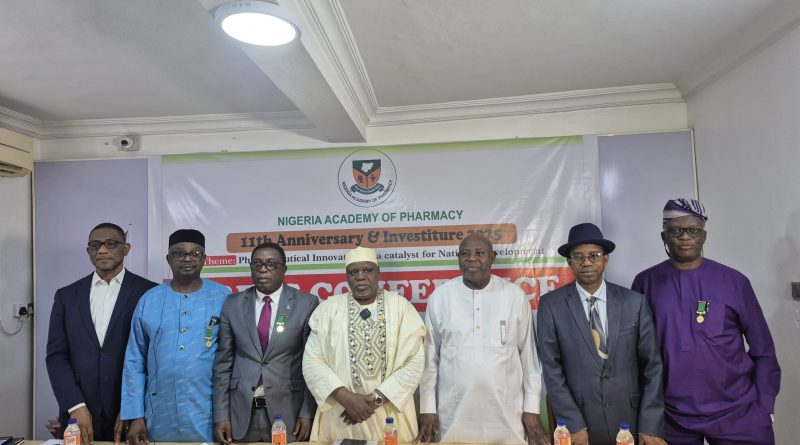Pharmacy Academy identifies barriers slowing innovation in Nigeria
The Nigeria Academy of Pharmacy (NAPHARM) has identified poor infrastructure, weak financing, and policy gaps as major factors hindering pharmaceutical innovation and industry growth in the country.
Speaking at a press conference in Lagos on Tuesday to unveil activities for the Academy’s 11th anniversary and 2025 investiture, the Vice President 2 of the Academy, Ahmed Yakasai, said Nigeria’s pharmaceutical sector cannot thrive without deliberate investment in innovation, infrastructure, and policy reform.
The events, scheduled to hold from 15 to 16 October at the Old Great Hall, College of Medicine, University of Lagos, Idi-Araba, will feature a public lecture themed “Pharmaceutical Innovation as a Catalyst for National Development.”
Infrastructure, policy challenges
Mr Yakasai, who is also the former President of the Pharmaceutical Society of Nigeria (PSN), stated that many Nigerian pharmaceutical companies struggle to meet international standards due to inadequate infrastructure.
The pharmacist noted that regulatory bodies such as the World Health Organisation (WHO) require strict compliance before companies can participate in the global market, but most local firms lack the needed facilities.
He also drew attention to the continued importation of essential raw materials such as sanitary and phytosanitary (SPS) and expanded polystyrene (EPS) from China and India, which he described as a sign of Nigeria’s infrastructural weaknesses.
“The pharmaceutical sector cannot thrive on import dependence,” he said. “We must build facilities that meet international benchmarks and encourage mergers so that our local companies can grow strong enough to compete.”
Mr Yakasai stressed that innovation requires significant capital investment, which is often beyond the capacity of indigenous firms. He recalled how a colleague was asked to provide N100 billion to build a pharmaceutical innovation facility, an amount he said was unrealistic for most local businesses.
He further criticised the government’s procurement policies that favour imported drugs despite the availability of quality local alternatives.
“Government must prioritise local manufacturers in its purchasing decisions if we are to strengthen production and safeguard our medicine security,” he said.

Financing, economic opportunity
Mr Yakasai further noted that pharmaceutical innovation and local drug production could become major drivers of Nigeria’s economic growth and job creation if adequately supported.
In his comments, the Director of Programmes at the Academy, Lolo Ojo, observed that the pharmaceutical industry can be a key contributor to GDP.
“One global company alone recorded a turnover of $59 billion last year, more than Nigeria’s national budget. With the right investment in local production and research, we can unlock similar potential,” Mr Ojo said.
The Academy also called for urgent investment in the local production of Active Pharmaceutical Ingredients (APIs) to reduce the country’s dependence on imports.
Mr Yakasai argued that Nigeria, despite being an oil-producing country, still imports basic raw materials needed to manufacture drugs.
“If we can establish API production through our petrochemical industries, we will move closer to true medicine security,” he said.

NAPHARM’s push for innovation
Mr Yakasai announced that the Academy is setting up a Research and Innovation Centre to drive indigenous pharmaceutical research, mentorship, and policy engagement.
He explained that the initiative forms part of the Academy’s 2025–2035 strategic blueprint, which focuses on advocacy, research, professional excellence, and public health impact.
READ ALSO: PT Health Watch: Lack of clear laws fueling surrogacy exploitation in Nigeria – Experts
“As Nigeria pursues self-reliance in healthcare and a diversified, knowledge-driven economy, the pharmaceutical profession must stand at the heart of that transformation,” he said.
The Academy’s upcoming two-day event will also feature the induction of 14 new Fellows, four Lifetime Achievement Awards, and six Honorary Fellows.
Part of this year’s activities will include a Valedictory Session in honour of the late pharmacist, Oludolapo Akinkugbe, one of Nigeria’s most respected pharmacists and a founding father of the profession.
Mr Yakasai described him as a visionary who “healed through leadership and left behind a legacy of integrity and service.”
He added that the Academy remains committed to preserving such legacies while inspiring the next generation of pharmacists through mentorship and recognition.
Mr Yakasai reiterated that NAPHARM has continued to advocate the inclusion of pharmacists in primary healthcare delivery, better remuneration, and clearer career progression pathways.
He also called for stronger collaboration among regulators, academia, and the media to enhance pharmacovigilance, combat antimicrobial resistance, and promote the responsible use of medicines.


